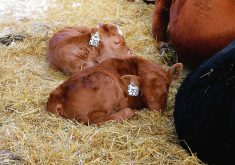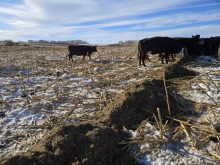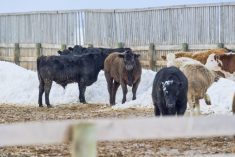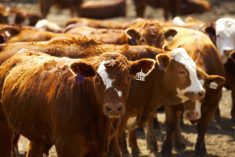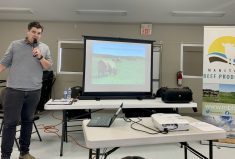Beef producers have been filling community halls across the province over the past month to hear updates on animal health concerns, industry support tools and progress made on trade agreements and research initiatives.
Members of the Manitoba Beef Producers (MBP) organization gathered in Strathclair on November 6 as general manger, Melinda German reviewed efforts made by the group over the past year.
“The advocacy work that we do takes up about 60 to 70 per cent of our time and budget. This is also probably the toughest stuff that we do and it is the item that takes the longest to influence, implement change and make change happen. But, it is also the most important work we do on behalf of producers,” said German.
Read Also

Beef sector seeks higher AgriStability cap
Facing unpredictable market conditions and rising expenses, Manitoba cattle producers would like to see an increased AgriStability cap.
MBP began holding its 14 district meetings on October 26 in Eriksdale which wrapped up on November 18 in Neepawa.
Water challenges was one of the group’s top priorities as it tries to achieve better access to AgriRecovery and tax deferral programs.
“We are not just looking at the immediate needs of producers during the times of crisis but because we are the bathtub drain of North America we need some long-term strategies to reduce the risk of water, whether it is too little or too much,” said German.
MBP has also been focused on pursuing more effective herd protection tools and improved compensation for predator losses.
“This is something that we have been and will continue to work on. We will be going back to speak with the government in December and are hoping to come away with some action items,” said German.
It was noted that MBP has been actively involved in the Rural Veterinarian Task Force Consultations that has been taking place in the province over the past few months.
“We have been meeting with the task force throughout its consultation process in a number of meetings and focus groups to express our priorities and how vital animal welfare and biosecurity are to our industry.”
Producers were alerted to an upcoming change to the National Farm Animal Care Council Code of Practice. According to German, alterations will be made in January, surrounding practices related to pain control when performing castrations and horn removal.
The group took a look at animal health concerns, including the appearance of bluetongue in Canada earlier this year.
“We detected bluetongue in Ontario, which doesn’t typically happen. We don’t see a lot of bluetongue in Canada and when we do it is typically confined to the Okanagan Valley where it is warmer. It was found in August, but this was considered a bit of an anomaly.”
An update on Crown lands and the community pasture program was given, as well as a glimpse into the various research initiatives the group has been supporting, including the Manitoba Beef and Forage Initiative, a fetal feeding program, forage variety trials, needle-free injection exploration and continued efforts in the eradication of bovine TB.
District meetings also provide members an avenue to bring forward resolutions that are then discussed at the organization’s annual meeting, which is scheduled for February 4 and 5 in Brandon.







